QuestionWhen our 6 month old leopard gecko became sluggish and lost his appetite a month ago, we immediately took him to our local herp vet. The gecko is housed in a 20 long glass terarium with calcium sand substrate. Heat is provided by a ceramic heat lamp and we keep the basking end of the tank at about 90 degrees. On the cool side of the tank (approx 73 degrees) is his hideout. Humidity is low, but we also keep a moist hut in the middle of the tank, so he can crawl in and get extra moisture when shedding. The gecko is fed primarily with crickets dusted with calcium and Repti-Vite. We supplement with occasional freeze-dried or live meal worms. The herp vet asked a few basic questions about our husbandry practices and decided to give him a shot of Vitamin A, and prescribed antibiotics. We began feeding the ecommended .1 cc of baby food, twice daily. A test of the stool sample I had brought in showed no parasites. When the gecko did not seem improved after a week, we brought him in for the second Vitamin A injection. Within two days, shedding had stopped, he ate a few crickets, the tight shed that had been keeping his eyes shut sloughed off and he could see again. The vet told us we did not need to come in again unless he worsened. Which he did, two days later. Again lethargic, eyes shot and skin starting to shed again. The third dose of Vitamin A was administered and the geocko is now clearly on the verge of death. I trusted my vet to make the right call, but further research on my own has me pretty convinced of Vitamin A toxicity. Skin is sloughing off like crazy, lizard is shrunken and darker in color, eyes closed, barely moving. I realize that it is too late for this pet, but I love geckos and want to get another one ASAP. However, I obviously want it to avoid this fate. Do you think it is possible that the lizard did have a Vitamin A deficiency but that we perhaps did not wait long enough for the injections to help before dosing him with more? Could my lighting have been to blame for the original problems? I have heard now that compact fluourescents may not be a safe source for UVB. My vet is at a loss and seems to have no other ideas that to give more Vitamin A, which very likely killed my pet. Any thoughts or insight you could provide would be greatly appreciated.
Answer If you had been using a compact or coil type of UVB source all the while I would suspect it for the death of your gecko, although if the animal was originally misdiagnosed, Hypervitaminosis A can be fatal itself. Either could have been at fault and only a proper necropsy could tell you for sure. If you do get another gecko, here is a good caresheet to compare to your set up. And get rid of that compact bulb!
CARE FOR A LEOPARD GECKO
Leopards are pretty easy to care for but they do need
special care. Here are some of the basic needs of your
gecko.
HOUSING: The need to have at least a 20 gallon long tank for
one Leo. This needs to have a secure fitting screen top...they can be quite the escape artists!!! They need to have a humid hide box.You can make
this with something as simple as a small plastic dish with a
hole cut in one side and a small mesh bag filled with some
Sphagnum moss, coconut bark or Peat moss that you mist.
I made mine out of the small plastic Folgers coffee containers...I cut an opening in the lid..and put the moss in..they LOVE it. I use the terrarium moss in mine.
I use that on the warm side of the tank. Be sure to provide a cool hidebox on the other end. I also provide a mid temperature hide...which is in the middle of the tank.I use the critter caves which you can purchase. NOT the ones that have heat in them!!!!
Provide secure climbing areas for your gecko. Fake plants, rocks and branches are all fine to use. be sure there are no wires or sharp ends to any fake plants you use.
SUBSTRATE:(that's the stuff on the floor of your tank) News
paper, lizard carpet or paper towels work great and are easy
to clean and are much safer than any loose substrate. Sand or other loose substrate is not recommended as that they can be deadly to the leo when it is ingested(eaten, even by accident while eating their insects)...
TEMPERATURES: They need a warm area of 88-92 degrees and a
cooler area in the upper 70s, low 80s. At night their
temperature can drop to the low to mid 70's.
Never use a hot rock for a leopard gecko...or any reptile.
They can severely burn any reptile. You can use a heating
pad under the tank,under tank heater, or you can use a regular household
lightbulb in a dome fixture with a ceramic socket in it to
keep the warm area at the 88-90 degree area.At night, no white light. If room temperatures stay above 70 degrees, no extra night heat is needed. The undertank heater or heating pad should cover about 1/3 of the tank....be sure to raise the tank up about 1/4-1/2 inch off the stand when using an undertank heat source to prevent heat build up which can cause the glass to break and hot spots in the glass. Be sure to have a good layer of newspaper, carpeting or, even a thin flat rock(such as tile) on top the area that the undertank heat source is placed...if you use a thin rock or tile, it helps to distribute the heat very well.
You can use the special nighttime lights that are designed for reptiles. I like using a ceramic heat emitter on a thermostat for nighttime heat.
DO NOT use black lights or party lights as they can cause eye damage!!!!
The wattage you use will vary based on room temperature and size of tank.
LIGHTING: Leopard geckos do not need UVB lighting but it does not hurt them to give them uvb. They should have some type of light during the day, be it a uvb tube, regular florescent light, reptile day light or regular household lightbulb. NO white lights at night!!!
FEEDING: Geckos should not be fed crickets or other insects that are bigger than the space between their eyes. Crickets and other food items such as silk worms, super, and an occasional treat of a wax worm, need to be dusted with a calcium supplement two times a week and also they should have a small dish of calcium in their tank. I use the lid of a milk jug for the little dish of calcium in their tank. For dusting the insects, Use a calcium with no added phosphorus. I use Rep Cal brand. The plain calcium for in the dish and I use the calcium with D3 to dust the insects.
Insects must be gut loaded(fed) for at least 48 hours prior to feeding your gecko. Remove any uneaten crix or superworms after 15-20 minutes..... Place a piece of cut potato in the tank so that if you have missed any uneaten insects, they will eat the potato instead of nibbling on your gecko!!!
You have to be sure to feed your crickets the right foods
before feeding them to your gecko. If your crickets/insects are not healthy and well fed, your gecko will not get the nutrition
he needs. You can gut load your crickets greens, veggies, cereals or specially designed commercial foods for crickets or the insects you are feeding.
Be sure to have a small dish of clean water for your gecko
at all times!!
You can offer them some baby food or fruits on occasion ...
Mine will even eat a small piece of watermelon now and then.
WATER: always provide a dish of drinking water. If you choose to mist your gecko to drink, its best to not get the tank too wet as that they do not do well with higher humidity. Sometimes its better to take your leo out of their tank to mist them to get them to drink!!! Above normal room humidity levels of 30-40% can cause breathing problems in the leos.
HANDLING: Some geckos enjoy being held...others prefer not to be handled at all. Be sure to be very gentle when holding your leo and NEVER grab them by the tail! Their tails are extremely fragile and will break.
I do suggest finding a vet that can treat reptiles BEFORE you actually need one!!! To find a vet that is able to care for reptiles:
http://www.anapsid.org/vets
For more information on leopard geckos:
http://www.thegeckospot.com/leocareindex2.html
http://www.drgecko.com

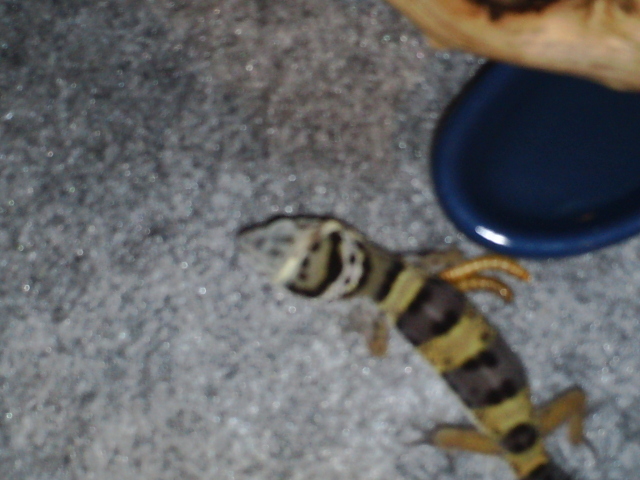 Temperature
QuestionStuck skin on geckos h
QUESTION: My leop
Temperature
QuestionStuck skin on geckos h
QUESTION: My leop
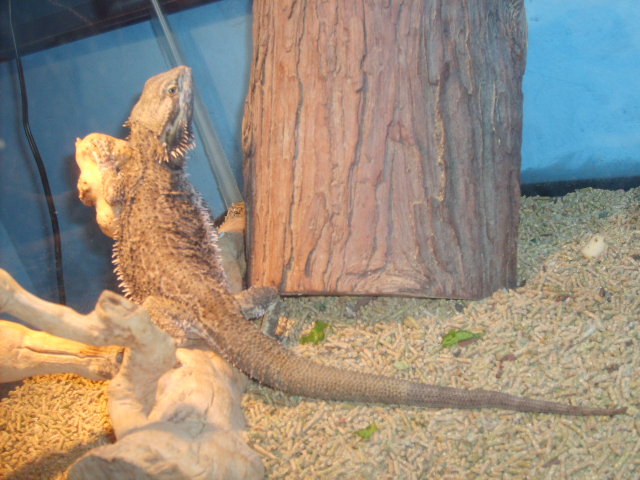 ranking beardie or not?
Question
BubbaBoy
i recently bought a bearded dragon it
ranking beardie or not?
Question
BubbaBoy
i recently bought a bearded dragon it
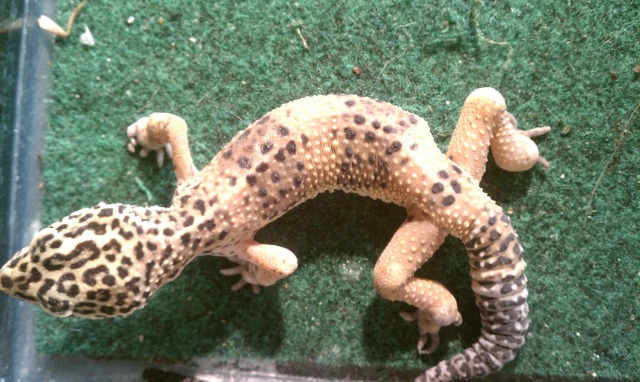 Leopard Gecko- All Kinds of Problems! :(
QuestionQUESTION: Hi! Ive had my male leopard gecko for
Leopard Gecko- All Kinds of Problems! :(
QuestionQUESTION: Hi! Ive had my male leopard gecko for
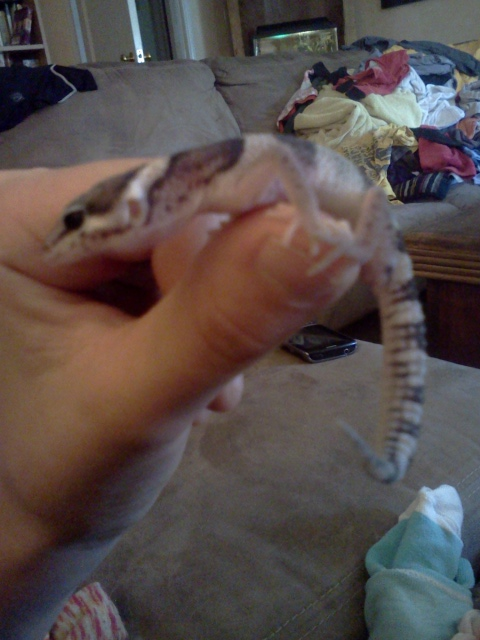 baby leopard gecko morph
Question
Rocky
I just got a super cute baby geck
baby leopard gecko morph
Question
Rocky
I just got a super cute baby geck
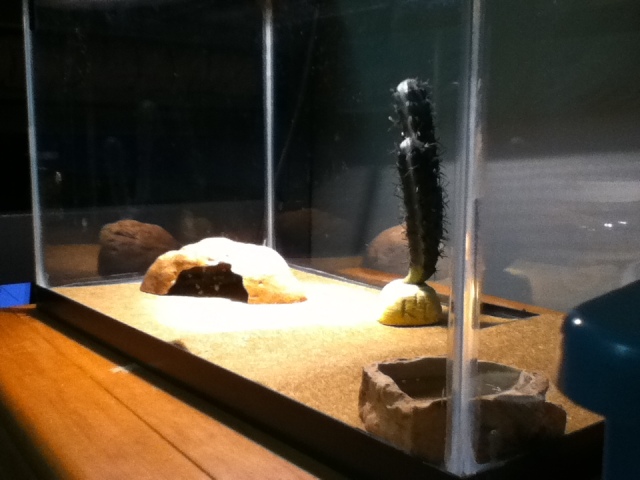 Lizard habitat
Question
Lizard cage
My old leopard gecko died.
Lizard habitat
Question
Lizard cage
My old leopard gecko died.